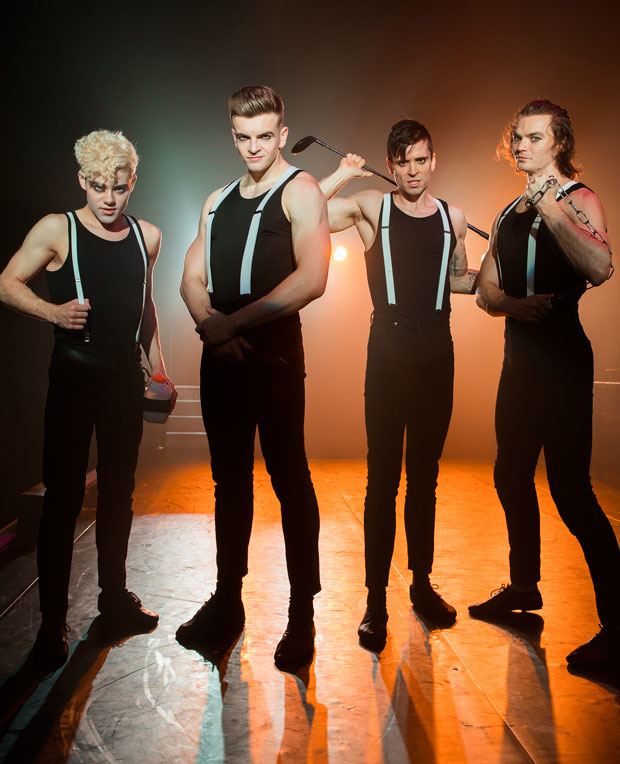A Clockwork Orange
Anthony Burgess’s classic tale of teenage ultraviolence gets a highly stylized, all-male staging off-Broadway.

(© Caitlin McNaney)
British author Anthony Burgess was not pleased when his American publisher insisted that his novel A Clockwork Orange appear without its original final chapter. Stanley Kubrick's iconic film also nixed the book's conclusion, which makes room for the redemption of its antihero Alex, an ultraviolent teenage menace to society. Burgess's original ending does appear, however, in the all-male, muscularly choreographed adaptation now running at New World Stages. Director Alexandra Spencer-Jones based this British import of A Clockwork Orange on Burgess's own play adaptation (first performed in 1998). Her testosterone-fueled, overtly homoerotic version diverges from the novel in its own ways, yet for 90 fast-paced minutes, this sexy, heart-pounding production never fails to entertain.
The story follows 15-year-old, classical-music-loving Alex deLarge (stunningly performed by Jonno Davies, also the show's fight captain) and his band of Droogs ("bros" in the boys' Russian-influenced teenage slang, Nadsat) as they create mayhem throughout their city. "What's it gonna be then, eh?" asks Alex as they drink drug-spiked beverages at the Korova Milk Bar. As usual, the Droogs — Dim (Sean Patrick Higgins), Georgie (Matt Doyle), and Pete (Misha Osherovich) — set out for a night of thieving, rape, and "ultraviolence." However, after a robbery goes very wrong, probation officer Mr. Deltoid (Timothy Sekk) and the law catch up with Alex and cart him off to prison, where a new brainwashing technique promises to rehabilitate violent offenders and turn them into peaceful citizens.
After submitting himself to this treatment, Alex experiences physical pain whenever he feels a violent impulse, but that presents a moral quandary for Alex's Chaplain (Sekk): "Is a man who chooses to be bad in some ways better than a man who is forced to be good?" Alex has little interest in philosophical questions about free will; he just wants his freedom. But after he's released from prison, Alex finds himself in the hands of political groups who want to use him for their own purposes. Ultimately, he'll have to decide the kind of man he wants to be.
Many of the novel's events are telescoped in this adaptation, so those unfamiliar with the book or film have to make imaginative leaps to keep up with the rapidly changing scenes. Yet most of the major plot points are made clear through physical storytelling (dance captain Aleksander Varadian keeps the energetic cast moving) as well as the dialogue (much of the Droogs' Nadsat vocabulary can be deciphered from context). With nine actors playing three dozen characters, Spencer-Jones directs the play with just enough detail to capture the story's big ideas.
Provocative as those ideas are, however, the story often takes a back seat to other elements of the production, such as the chiseled, bare-chested actors who gyrate, dance-fight, and occasionally lock lips onstage. Ironically, this decidedly homoerotic sensibility feels appropriate in the context of Burgess's hypermasculine tale; sex, for Alex, is a way to assert power and domination over others, including his Droogs. Dehumanizing his victims makes gender a peripheral detail.
The show's violent, sexually charged energy is pumped up even more by an exciting soundtrack that includes (along with selections from Alex's favorite composer, Beethoven) songs like Frankie Goes to Hollywood's "Relax" and David Bowie's "We Are the Dead" (Emma Wilk created the pulsating sound design), and Jennifer A. Jacob's costumes accentuate the physiques of the muscle-flexing cast with simple tank tops and suspenders.
Missing from this production is the graphic depiction of the brutal violence committed by Alex and the Droogs in the novel (and the film). As with the gang wars between the Jets and the Sharks in West Side Story, the highly stylized choreography tamps down the viciousness. But that's not a bad thing. More important than the story's notorious violence is Burgess's concern with free will and Alex's ability to choose. Those ideas are returned to the story in this thought-provoking, eye-catching Clockwork.









